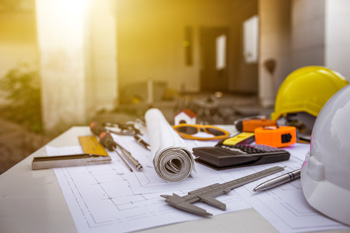VAT: New accounting procedures for builders - Effective from 1 October 2020

Hidden amongst all the Brexit announcements, HMRC are proposing to introduce new accounting procedures which will affect any VAT-registered construction business that does the following:
- Buys in construction services from other builders and makes an onward supply of those services to another customer e.g. where a subcontractor invoices the main contractor on a project, and the main contractor invoices the final 'end-user' client.
- Sells construction services to other builders where the builders make an onward supply of the services to their customer.
Initially due to come into force on 1st October 2019, this has now been delayed until 1 March 2021.
Reason for change
HMRC has identified that certain supplies by builders have been prone to VAT fraud, where the supplier charges VAT to his customer, receives money for this VAT from the customer but never declares it on a VAT return. This means that HMRC are defrauded of the VAT being charged. The new procedures aim to prevent this from happening because the supplier is no longer paid VAT.
The Changes
Under current rules, a builder charges VAT to their customer and declares that VAT as Output tax on their VAT return.
This is changing for supplies between VAT-registered builders. The builder will only invoice their builder customer without charging VAT and the customer not the supplier makes the Box 1 entry on their own VAT return declaring Output VAT.
In effect, there will be no cash flow issue for the builder receiving the services because the same amount of VAT declared in Box 1 will also be included as input tax in Box 4: This VAT accounting practice is known as “Reverse Charge”.
Which sales are caught by the new rules?
The new reverse charge procedures will apply to the following transactions:
- The reverse charge will affect supplies of building and construction services supplied at the standard or reduced rates that also need to be reported under CIS. These are called specified supplies. It will not apply to Zero rate supplies
- The legislation refers to “specified services” but these do not apply to services supplied to non-construction businesses, such as a retailer having their premises improved or any other end-user customer or building owner;
- The reverse charge will also apply to any goods supplied by the builder as part of their work;
- Employment businesses are excluded from the new rules;
- The reverse charge is based on the rate of VAT that applies for the work in question but only supplies subject to either 5% or 20% VAT. Zero-rated sales are excluded.
What contractors need to do?
If you're a contractor you'll need to review all your contracts with sub-contractors, to decide if the reverse charge will apply to the services you receive under your contracts. You'll need to notify your suppliers if it will.
What sub-contractors need to do?
If you're a sub-contractor you'll need to contact your customers to get confirmation from them if the reverse charge will apply, including confirming if the customer is an end user or intermediary supplier.
There are a few other points you need to consider:
- Checks should be applied to ensure building contractor clients invoiced under the new rules are properly registered for VAT and are bona fide.
- HMRC suggests that if there are any doubts about the credentials of a builder customer, then a deposit equal to the amount of VAT not being charged should be collected from the customer e.g. if they have applied for but not received a VAT number.
Summary
Many sub contactors are unaware of these changes, if you are affected please do not hesitate to contact our tax advisers who will be able to provide advice appropriate to your business circumstances.
Or find out more about our Tax and VAT services.